Ceasefire Magazine has just run a thorough review of Max Forte’s book Slouching Towards Sirte, NATO’s War on Libya and Africa written by Dan Glazebrook.
The media has gone very quiet on Libya of late; clearly, liberal imperialists don’t like to dwell on their crimes. This is not surprising. The modus operandi of the humanitarian imperialist is not one of informed reflection, but only permanent outrage against leaders of the global South; besides, in the topsy-turvy world of liberal interventionism, the ‘failure to act’ is the only crime of which the West is capable. As Forte puts it, their moral code holds that “If we do not act, we should be held responsible for the actions of others. When we do act, we should never be held responsible for our own actions.”
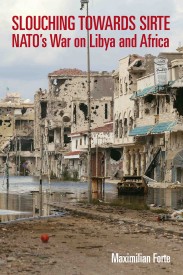 With Gaddafi dead, the hunt is on for a new hate figure on whom to spew venom (Assad, Jong-Un); far more satisfying than actually evaluating our own role in the creation of human misery. This is the colonial mentality of the liberal lynch mob.
With Gaddafi dead, the hunt is on for a new hate figure on whom to spew venom (Assad, Jong-Un); far more satisfying than actually evaluating our own role in the creation of human misery. This is the colonial mentality of the liberal lynch mob.
For the governments that lead us into war, of course, it makes perfect sense that we do not stop to look back at the last invasion before impatiently demanding the next one – if we realised, for example, that the 1999 bombing of Serbia (the textbook ‘humanitarian intervention’) actually facilitated the ethnic cleansing of Kosovo that it was supposedly designed to prevent, we might not be so ready to demand the same treatment for every other state that falls short of our illusory ideals.
That is why this book is so important. Thoroughly researched and impeccably referenced, it tells the story of the real aims and real consequences of the war on Libya in its historical perspective.
Its author, Maximilian Forte, is well placed to do so. A professor of social anthropology in Montreal, much of his writing and research in recent years has been dedicated to the new imperialism, and especially its ‘humanitarian’ cover. He was amongst the first to really expose violent racism within the Libyan insurrection, and its role in facilitating NATO’s goals in Africa, and has provided consistently excellent analyses of the media coverage surrounding the conflict.
One of the book’s accomplishments is its comprehensive demolition of the war’s supposed justifications. Forte shows us that there was no ‘mass rape’ committed by ‘Gaddafi forces’ – as alleged by Susan Rice, Hillary Clinton, Luis Ocampo and others at the time, but later refuted by Amnesty International, the UN and even the US army itself.
Despite hysterical media reports, there was no evidence of aerial bombing of protesters, as even CIA chief Robert Gates admitted. Gaddafi had no massacre planned for Benghazi, as had been loudly proclaimed by the leaders of Britain, France and the USA: the Libyan government forces had not carried out massacres against civilian populations in any of the other towns they recaptured from the rebels, and nor had Gaddafi threatened to do so in Benghazi; in a speech that was almost universally misreported in the Western media, he promised no mercy for those who had taken up arms against the government, whilst offering amnesty for those who ‘threw their weapons away’, and at no point threatening reprisals against civilians.
When the NATO invasion began, French jets actually bombed a small retreating column of Libyan armour on the outskirts of Benghazi, comprising 14 tanks, 20 armoured personnel carriers, and a few trucks and ambulances – nothing like enough to carry out a ‘genocide’ against an entire city, as had been claimed.
Indeed, the whole image of ‘peaceful protesters being massacred’ was turning reality on its head. In fact, Forte notes, rebels “torched police stations, broke into the compounds of security services, attacked government offices and torched vehicles” from the very start, to which the authorities responded with “tear gas, water cannons and rubber bullets – very similar to methods frequently used in Western nations against far more peaceful protests that lacked the element of sedition”. Only once the rebels had proceeded to occupy the Benghazi army barracks, loot its weapons, and start using them against government forces did things begin to escalate.
Myth of the Dark Heart
But the most pernicious of the lies that facilitated the Libyan war was the myth of the ‘African mercenary’. Racist pogroms, Forte argues, were characteristic of the Libyan rebellion from its very inception, when 50 sub-Saharan African migrants were burnt alive in Al-Bayda on the second day of the insurgency. An Amnesty International report from September 2011 made it clear that this was no isolated incident: “When al-Bayda, Beghazi, Derna, Misrata and other cities first fell under the control of the NTC in February, anti-Gaddafi forces carried out house raids, killing and other violent attacks” against sub-Saharan Africans and black Libyans, and “what we are seeing in western Libya is a very similar pattern to what we have seen in Benghazi and Misrata after those cities fell to the rebels” – arbitrary detention, torture and execution of black people.
The ‘African mercenary’ myth was thus created to justify these pogroms, as the Western media near-universally referred to their victims as ‘mercenaries’ – or ‘alleged mercenaries’ in the more circumspect and highbrow outlets – and thus as aggressors and legitimate targets. The myth was completely discredited by both Amnesty International – whose exasperated researcher told a TV interviewer that “We examined this issue in depth and found no evidence: the rebels spread these rumors everywhere [with] terrible consequences for African guest workers” – and by a UN investigation team, who drew similar conclusions – but not until both organisations had already helped perpetuate the lie themselves.
That liberal humanitarians would launch a war of aggression in order to facilitate racist massacres is not as ironic as it might at first seem. Forte writes that “if this was humanitarianism, it could only be so by disqualifying Africans as members of humanity.” But such disqualification has been a systematic practice of liberalism from the days of John Locke, through the US war of independence and into the age of nineteenth century imperialism and beyond.
Indeed, Forte argues that the barely-veiled “racial fear of mean African bogeymen swamping Libya like zombies” implicit in the ‘African mercenary’ story, was uniquely and precisely formulated to tap into a rich historical vein of European fantasies about plagues of black mobs. That the myth gained so much traction despite zero evidence, says Forte, “tells us a great deal about the role of racial prejudice and propaganda in mobilizing public opinion in the West and organizing international relations”.
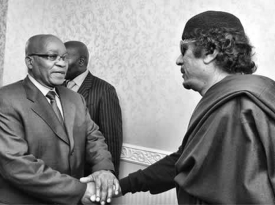
South African President Jacob Zuma meets with Mouammar Gaddafi on May 30, 2011 as part of an African Union effort to find a peaceful solution to the conflict.
Yet the racism of the rebel fighters was not only useful for mobilising European public opinion – it also played a strategic function, as far as NATO planners were concerned. By bringing to power a virulently anti-black government, the West has ensured that Libya’s trajectory as a pan-African state has been brought to a violent end, and that its oil wealth will no longer be used for African development. As Forte succinctly put it, “the goal of US military intervention was to disrupt an emerging pattern of independence and a network of collaboration within Africa that would facilitate increased African self-reliance. This is at odds with the geostrategic and political economic ambitions of extra-continental European powers, namely the US”.
A large part of the book is dedicated to outlining Libya’s role in the creation of the African Union, and its subsequent moves to unify Africa at the economic, political and military levels. This included the investment of billions of petrodollars in industrial development across the continent, the creation of an African communications satellite, and massive financial contributions towards the African Development Bank and the African Monetary Fund – institutions designed specifically to challenge the hegemony of the International Monetary Fund and the World Bank. Gaddafi, Forte argues, was passionate about using Libyan oil money to help Africa industrialise and “add value” to its export materials, moving it away from its prescribed role in the global economy as a supplier of cheap raw materials.
A US-led Scramble for Africa
This was a threat to Western financial and corporate control of African economies, and combined with the rise of Chinese investment, was considered a strategic obstacle to Western domination that had to be removed. As Forte put it, “The US, France and the UK could not afford to see allies that they had cultivated, if not installed in power, being slowly pulled from their orbits by Libya, China and other powers”.
The African Oil Policy initiative Group – a high level US Committee comprising members of Congress, military officers and energy industry lobbyists – noted in 2002 the growing dependence of the US on African oil, and recommended a “new and vigorous focus on US military cooperation in sub-Saharan Africa, to include design of a sub-unified command structure which could produce significant dividends in the protection of US investments”. They noted that “failure to address the issue of focusing and maximizing US diplomatic and military command organization…could…act as an inadvertent incentive for US rivals such as China [and] adversaries such as Libya”. In other words, with their economic grip on the continent facing serious challenge, the Western world would increasingly have to rely on aggressive militarism in order to maintain its interests.
The recommendations of the committee would be implemented in 2006 with the creation of AFRICOM – the US army’s African Command. AFRICOM was conceived as a sort of ‘School of the Americas’ for Africa, designed to train African armies for use as proxy forces for maintaining Western control, with the 2010 US National Security Strategy specifically naming the African Union as one of the regional organisations it sought to co-opt.
Libya, however, proved most uncooperative. The leaked US diplomatic cables make it very clear that Libya was viewed by the US as THE main obstacle to establishing a full muscular US military presence on the African continent, regularly highlighting its “opposition” and “obstruction” to AFRICOM. With Gaddafi still a respected voice within the AU, having served as its elected Chairman in 2009, he wielded significant influence, and used this to spearhead opposition to what he considered the neocolonial aims of the AFRICOM initiative.
Meanwhile, Chinese investment in Africa was growing rapidly, having grown from $6 billion in 1999 to $90 billion ten years later, displacing the US as the continent’s largest trading partner. The need for a US military presence to cling on to the West’s declining influence in Africa was growing ever more urgent. But Africa was not playing ball – and Gaddafi was (rightly) seen as leading the charge.
Fast forward to 2012, and US General Carter Ham, head of AFRICOM, was able to claim that “the conduct of military operations in Libya did afford now the opportunity to establish a military to military relationship with Libya, which did not previously exist”. He went on to suggest that a US base would be established in the country (Gaddafi having expelled both the US and British bases shortly after coming to power in 1969), saying that some “assistance” would probably be necessary, in the form of a “military presence”. President Obama wasted no time in announcing the deployment of soldiers to four more African countries within weeks of the fall of Tripoli, and AFRICOM announced an unprecedented 14 joint military exercises in Africa for the following year.
A sign of things to come
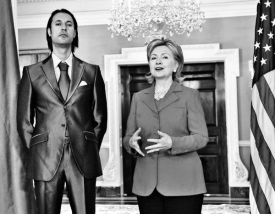
Hillary Clinton welcomes Muatassim Gaddafi at State Department, April 21, 2009.
Forte argues that NATO’s attack had not only destroyed a powerful force for unity and independence in Africa, and a huge obstacle to Western military penetration of the continent, but it had also created the perfect conditions to justify further invasions. The US had previously attempted to argue that its military presence was required in North Africa in order to fight against Al Qaeda; indeed, it had set up the Trans-Saharan Counter Terrorism Programme to this end. But as Muattasim Gaddafi had explained to Hilary Clinton in Washington in 2009, the programme had been rendered redundant by the existing, and highly effective, security strategy of CEN-SAD (the Libyan-led Community of Sahel and Saharan states) and the North African Standby Force.
Like a classic protection racket, however, the British, US and French decided that if their protection wasn’t needed, then they would have to create a need for it. The destruction of Libya tore the heart out of the North African security system, flooded the region with weapons and turned Libya into an ungoverned safe haven for violent militias. Now the resulting – and entirely predictable – instability has spread to Mali, the West are using it as an excuse for another war and occupation. In a prescient warning (the book was published before France’s recent invasion of Mali), Forte wrote that “intervention begets intervention. More intervention is needed to solve the problems caused by intervention.”
The book is also very strong in exposing the ideology of the ‘human rights industry’ and its role in bringing about the Libyan war. Western liberal humanitarianism, argues Forte, “can only function by first directly or indirectly creating the suffering of others, and by then seeing every hand as an outstretched hand, pleading or welcoming”.
Forte goes on to expose the role of groups like Amnesty International and Human Rights Watch, who helped perpetuate some of the worst lies about what was happening in Libya, such as the fictitious ‘African mercenaries’ and ‘mass rape’, and who in the case of Amnesty, “mere days into the uprising and well before it had a chance to ascertain, corroborate or confirm any facts on the ground…began launching public accusations against Libya, the African Union and the UNSC for failing to take action”. By calling for an assets freeze on Libya and an arms embargo (“and more actions with each passing day”), Amnesty “thus effectively made itself a party to the conflict”; it had become part of the propaganda war and mythmaking that was designed to facilitate the invasion.
This should not be surprising given Amnesty’s history. Forte helpfully recalls that their promotion of the infamous “incubator babies” myth that justified the Iraq war of 1991 was later singled out by several US Senators as having influenced their decision to vote for the attack. In the event, the Senate vote was passed by a majority of just six. The 1991 war devastated Iraq, which had barely recovered from the Iran-Iraq war, killing well over 100,000 people, as well as hundreds of thousands more from the diseases that ravaged the country following the deliberate destruction of its water and sewerage systems.
So it should be little surprise that Suzanne Nossel, a State Department official on Hilary Clinton’s team, was made Executive Director of Amnesty-USA in November 2011. In her State Department job, Nossell had played a key role drawing up the UN Human Rights Council resolution against Libya that ultimately formed the basis for Security Council Resolution 1973 that led to the aggression.
Forte also discusses the role of Bouchuiguir, the ‘human rights activist’ who emerges as the Libyan ‘Curveball’. Curveball was the Iraqi ‘source’ who came up with the lies about Saddam’s nonexistent ‘mobile chemical weapons factories’ that were used to justify the 2003 Iraq war. Likewise, Bouchuiguir’s wildly inflated casualty figures provided the raw material for the hysterical UNHRC resolutions against Libya that set the ball for war rolling. He later admitted on camera that there was no evidence for his claims – but not before 70 NGOs had signed a petition ‘demanding action’ in response to them.
Much has been written elsewhere about the ‘neo-cons’ who became (rightly) hated for their brutally idiotic conceptions of social change. But, as Forte’s book shows, the liberal humanitarians are perhaps even more contemptible; after all, at least the neo-cons never claimed to be kind, or even interested in anything other than their own self-interest. Yet the liberal humanitarians seem – or at least claim – to be driven by some kind of higher purpose, which makes their constant calls for wars of aggression even more repulsive. Forte puts this brilliantly:
“The vision of our humanity that liberal imperialists entertain is one which constructs us as shrieking sacks of emotion. This is the elites’ anthropology, one that views us as bags of nerve and muscle: throbbing with outrage, contracting with every story of ‘incubator babies’, bulging up with animus at the arrest of Gay Girl in Damascus, recoiling at the sound of Viagra-fuelled mass rape. From mass hysteria in twitter to hundreds of thousands signing an online Avaaz petition calling for bombing Libya in the name of human rights, we become nerves of mass reaction….We scream for action via ‘social media’, thumbs furiously in action on our ‘smart’ phones. ..Then again, our “action” merely consists of asking the supremely endowed military establishment to act in our name.”
This anthropology is of course “accompanied by NATO’s implicit sociology: societies can be remade through a steady course of high altitude bombings and drone strikes.”
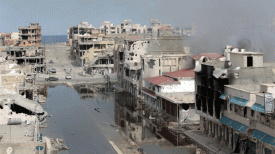 How exactly Libya has been remade is also discussed in the book. The July 2012 elections in Libya, their very existence trumpeted in Western media as immediately vindicating every act of butchery the war brought about – regardless of whether the parliament being elected was likely to wield any actual influence over the country – saw fewer than half the eligible voting population take part. Even more intriguing were the results of a survey carried out in Libya by Oxford Research International that found that only 13% of Libyans said they wanted democracy within a year’s time, and only 25% within five years.
How exactly Libya has been remade is also discussed in the book. The July 2012 elections in Libya, their very existence trumpeted in Western media as immediately vindicating every act of butchery the war brought about – regardless of whether the parliament being elected was likely to wield any actual influence over the country – saw fewer than half the eligible voting population take part. Even more intriguing were the results of a survey carried out in Libya by Oxford Research International that found that only 13% of Libyans said they wanted democracy within a year’s time, and only 25% within five years.
Meanwhile, the new authorities set about persecuting their opponents, real and imagined. The town of Tawergha was emptied of its entire population of around 20,000 black Libyans after militias from Misrata began systematically torching every home and business in the town, with the support of the central government. Former residents now reside in refugee camps where they continue to be hunted down and killed, or in arbitrary detention in makeshift prisons. Candidacy for elections is barred to: workers (a professional qualification is needed); anyone who ever worked in any level of government between 1969 and 2011 (unless they could demonstrate “early and clear” support for the insurrection); anyone with academic study involving Gaddafi’s Green book; and anyone who ever received any monetary benefit from Gaddafi.
A constitutional lawyer noted these restrictions would disqualify three quarters of the Libyan population. Other new laws banned the spreading of “news reports, rumours or propaganda” that could “cause any damage to the state”, with penalties of up to life in prison; and prison for anyone spreading information that “could weaken the citizens’ morale” or for anyone who “attacks the February 17 revolution, denigrates Islam, the authority of the state or its institutions”.
This is the new Libya for which the human rights imperialists and their allies lobbied, killed and tortured so hard. “The next time empire comes knocking in the name of human rights”, concludes Forte, “please be found standing idly by”.
Forte’s book is a must-read for anyone seriously interested in understanding the motives and consequences of the West’s onslaught against Libya and African development.
Slouching Towards Sirte, NATO’s War on Libya and Africa
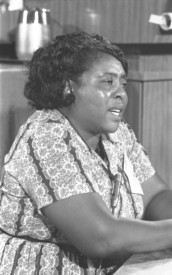
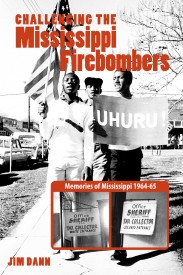 Jim Dann volunteered for the Mississippi Summer Project organized by the Student Nonviolent Coordinating Committee (SNCC) in 1964 and stayed on the following year as an SNCC field secretary. He lived in Vacaville, California. Jim died of leukemia on June 16, 2013.
Jim Dann volunteered for the Mississippi Summer Project organized by the Student Nonviolent Coordinating Committee (SNCC) in 1964 and stayed on the following year as an SNCC field secretary. He lived in Vacaville, California. Jim died of leukemia on June 16, 2013.
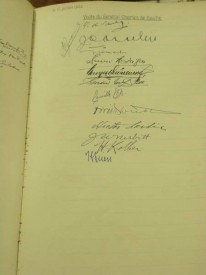

 Because “humanitarian intervention” in Libya has been a disaster, nobody wants to talk about it now. But it also has wounded the norm of R2P. Even the most ardent supporters of R2P who dubbed the war on Libya “the high-water mark” shy away from talking about it.
Because “humanitarian intervention” in Libya has been a disaster, nobody wants to talk about it now. But it also has wounded the norm of R2P. Even the most ardent supporters of R2P who dubbed the war on Libya “the high-water mark” shy away from talking about it.

 How exactly Libya has been remade is also discussed in the book. The July 2012 elections in Libya, their very existence trumpeted in Western media as immediately vindicating every act of butchery the war brought about – regardless of whether the parliament being elected was likely to wield any actual influence over the country – saw fewer than half the eligible voting population take part. Even more intriguing were the results of a survey carried out in Libya by Oxford Research International that found that only 13% of Libyans said they wanted democracy within a year’s time, and only 25% within five years.
How exactly Libya has been remade is also discussed in the book. The July 2012 elections in Libya, their very existence trumpeted in Western media as immediately vindicating every act of butchery the war brought about – regardless of whether the parliament being elected was likely to wield any actual influence over the country – saw fewer than half the eligible voting population take part. Even more intriguing were the results of a survey carried out in Libya by Oxford Research International that found that only 13% of Libyans said they wanted democracy within a year’s time, and only 25% within five years.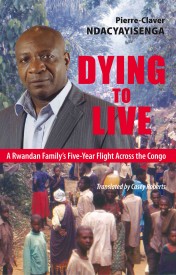 Buy
Buy 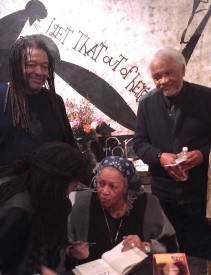
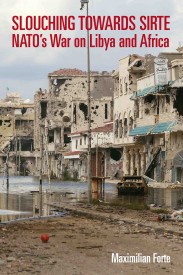 This weekend, marking the second anniversary of the start of protests that would usher in a bloody and prolonged NATO-led coup to overthrow the Libyan Jamahiriya and Muammar Gaddafi, offers many reasons to celebrate for those whose intention was the demolition of Libyan self-determination, African integration, and a domestic system of extensive social welfare and stability. In return, Libyans have won the right to live in fear, as they have won the freedom to be ruled by countless armed despots each engaged in torture, abductions, and persecution of minorities. In spite of what seems like an unstoppable momentum towards greater strife and social disintegration, romantic imperialists in the West still insist on speaking in the most unwarranted terms of the “street revolution,” that has “brought freedom and hope to millions of people here” (
This weekend, marking the second anniversary of the start of protests that would usher in a bloody and prolonged NATO-led coup to overthrow the Libyan Jamahiriya and Muammar Gaddafi, offers many reasons to celebrate for those whose intention was the demolition of Libyan self-determination, African integration, and a domestic system of extensive social welfare and stability. In return, Libyans have won the right to live in fear, as they have won the freedom to be ruled by countless armed despots each engaged in torture, abductions, and persecution of minorities. In spite of what seems like an unstoppable momentum towards greater strife and social disintegration, romantic imperialists in the West still insist on speaking in the most unwarranted terms of the “street revolution,” that has “brought freedom and hope to millions of people here” (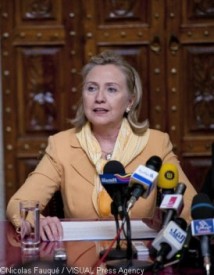


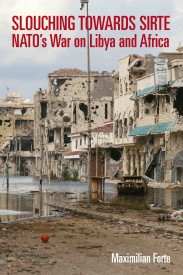 “
“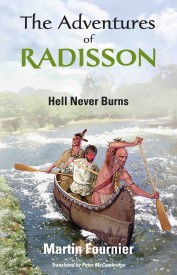 “
“



Facebook